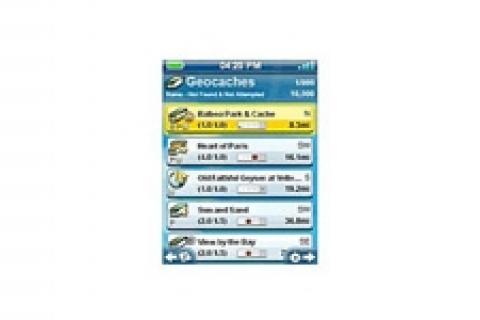
Campers are finding out that geocaching is an entertaining activity to enjoy while camping. Numerous campground managers, geocaching clubs, and simply individuals continue to grow the sport that becomes addicting. Surprisingly, many folks aren't sure just how the game of geocaching goes. So here are a few basics to get you started treasure hunting, using a Global Positioning Unit (GPS) as your guide.
 |
| A basic handheld GPS will work, but some units, like the Magellan eXplorist, is dedicated to geocaching. |
Geocaching is treasure hunting, but with a twist — the treasure's location is not a secret. Caches, the treasure, are normally containers that hold trinkets, books, etc., that are hidden by the cache owners. Once hidden, the cache's coordinates are determined with a GPS unit. Then, the coordinates are displayed to geocachers via internet or other sources such as newsletters distributed by geocaching clubs, various visitors bureaus, or at the campground office.
Geocachers follow the provided coordinates with a handheld GPS unit and head out in search of the hidden container. Once found, the finder takes a trinket and leaves another in trade or signs a guestbook. Once an entry to the cache's logbook is completed, which is kept in the cache container, and then the cache is returned to its hiding place for the next geocacher to locate.
You would be surprised at the number of caches stashed within a mile or two of your home. Local caches are the perfect targets to get a feel of the game. When making reservations at the campground, ask the employee if geocaching targets are on the premises. Even if the campground doesn't have any hidden treasure, a quick web search will reveal multiple cache locations.
Outfitting yourself or your family for a day of hidden treasure hunting doesn't cost a fortune, and if you already own a handheld GPS unit, you're ready to go. Another recommended geocaching tool is a map with the most detail as possible of the targeted area. A printed map is a back up to the electronic version for a quick, wide view of the area that includes several details that may not be available on the handheld.
If you're in the market for a new GPS, the most basic unit will do. The primary statistic a geocacher needs is the cache's coordinates. Although, the better the GPS unit, the better the accuracy. If a cache is found to be off the mark a few feet or yards, it may not be your unit-it could be the coordinates presented are inaccurate. Locating the cache is the goal, but the search should be just as fun.
- 3258 views

